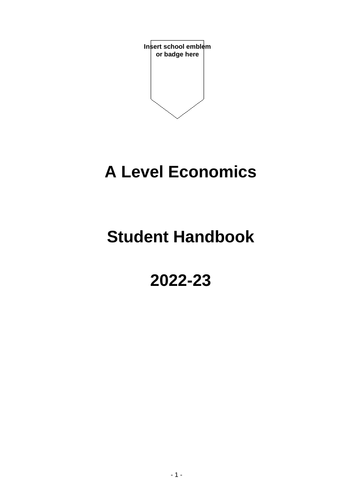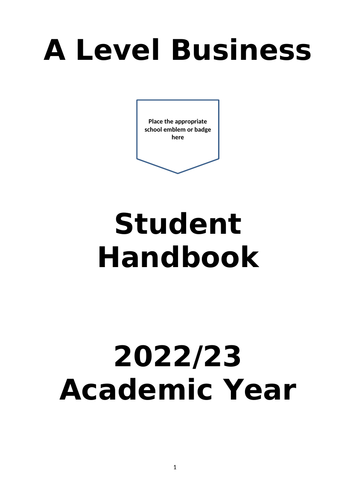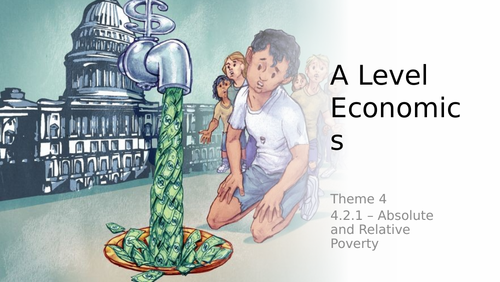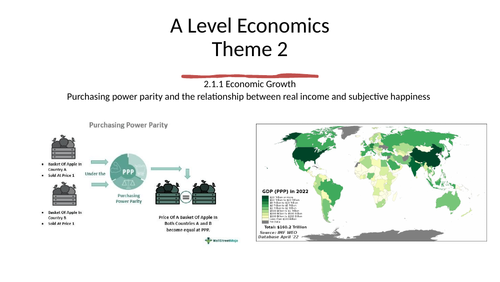168Uploads
34k+Views
15k+Downloads
Economics

GCSE Business Studies - Pearson Edexcel - Theme 1 and 2 Crosswords
The resources available for purchase are ten individual crosswords based on the GCSE Business (9-1) Pearson Edexcel syllabus (1BS0). Each crossword includes at least 10 clues allowing students to decipher the hidden keyterms and are based on one of the ten units of work from Theme 1 (1.1, 1.2, 1.3, 1.4 and 1.5) and Theme 2 (2.1, 2.2, 2.3, 2.4 and 2.5). Answers are also included.
The crosswords can be used as:
Retrieval activities
Revision activities at the end of the two year GCSE course
Cover work, while department staff are absent
Starter or plenary activities

A Level Economics Student Introduction Handbook
The handbook is designed to be given to Year 12 students starting the Pearson Edexcel A Level GCE Economics course (8EC0 and 9EC0). It includes;
A curriculum map
A detailed overview of the three externally examined papers
An essential reading list
Suggested films to watch with economic content
Suggested Youtube Channels related to economics
The exam skills needed to thrive in A Level Economics
22 pages in length, over 4000 words and can easily be adapted for individual departments.

A Level Business Student Handbook - Introduction to the Edexcel A Level Business Course (9BS0)
The handbook is designed to be given to Year 12 students starting the Pearson Edexcel A Level GCE Business course (9BS0). It includes;
A detailed topic list
A detailed overview of the three externally examined papers
An essential reading list and wider reading list
Suggested television documentaries and programmes to watch with contextual business content.
Suggested Youtube Channels related to business
Department expectations regarding attendance, equipment, homework and independent study
20 pages in length, over 2900 words and can easily be adapted for individual departments.

A Level Economics - Theme 4 - Pearson Edexcel - 4.2 - Poverty and Inequality
The resources available for purchase are designed to teach the Pearson Edexcel Theme 4 complete unit of work 4.2 Poverty and Inequality.
Included is:
A retreival activity based on the previous unit of work (4.1 - International Economics)
Engaging Powerpoints containing the key theory, activities and contextual Youtube videos and
Past paper exam questions (4, 8 and 10 mark questions)
Example student answers to the included past paper questions giving the opportunity for peer assessment activities
A 25 mark past paper question designed to be given as a homework or timed assessment task

Pearson Edexcel - A Level Economics - Flip Learning Booklets - Theme 1, 2, 3 and 4
The resources available for purchase are designed to be used to to promote Flip Learning to students studying the **Pearson Edexcel A Level Economics syllabus **
Further details are below:
Theme 1 Flip Learning Booklet - 31 pages (1649 words)
Theme 2 Flip Learning Booklet - 37 pages (1683 words)
Theme 3 Flip Learning Booklet - 33 pages (2331 words)
Theme 4 Flip Learning Booklet - 45 pages ( 4439 words)
Each booklet covers each unit of work from the specification (9EC0) and includes links to electronic resources such as Youtube videos, online articles , case studies and the textbook Edexcel AS/A Level Economics Student book + Active Book (Edexcel GCE Economics 2015) ISBN-10 1447990552

A Level Economics - Theme 2 - 2.1.1 - Economic Growth
The resources available for purchase are designed to teach the Pearson Edexcel A Level Economics Theme 2 topic of 2.1.1 Economic Growth over at least 120 minutes of teaching time.
Further details on the content and structure of the resources are below:
First power point addresses the difference real, nominal GDP, GDP per capita and the comparison of growth rates between countries over time. A worksheet is also included to allow independent pupil research
The second power point addresses the use of GDP to compare living standards
between countries and over time. A small number of low mark past paper questions are included designed to be given to pupils as homework.
The third power point addresses the use of of Purchasing Power Parities (PPPs) and the use of PPP-adjusted figures in international comparisons and the relationship between real incomes and subjective happiness.
Each power point includes the key theory, concurrent Youtube videos, up to date statistics and activities to break up the learning and ensure lessons are less didactic in nature.






